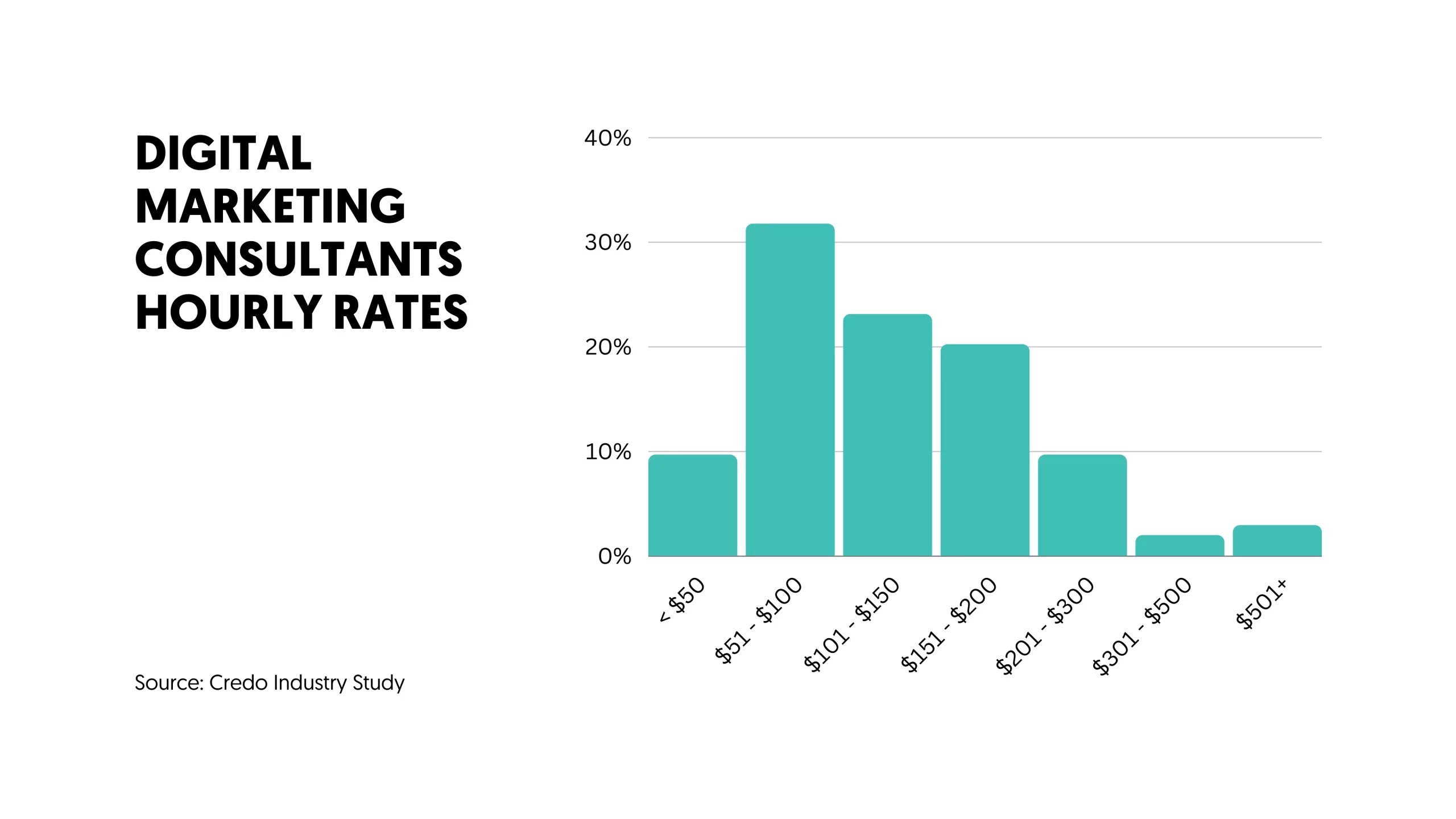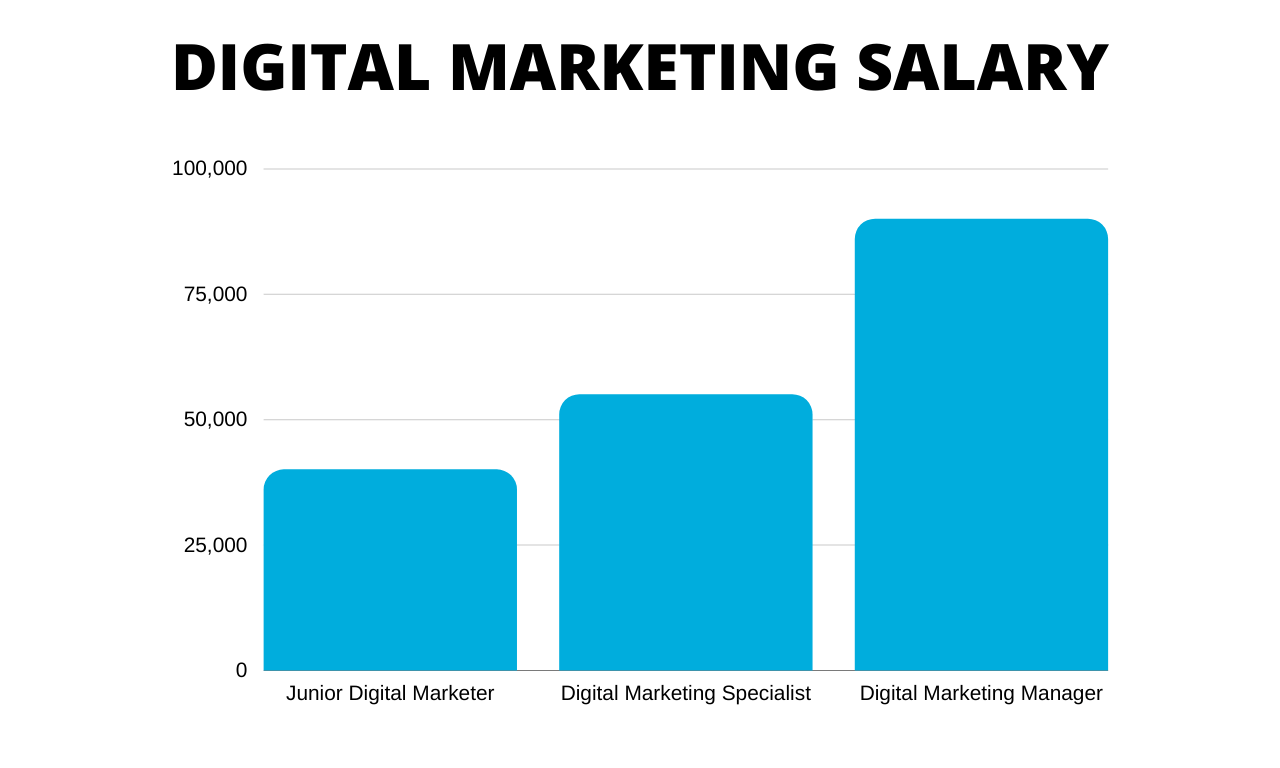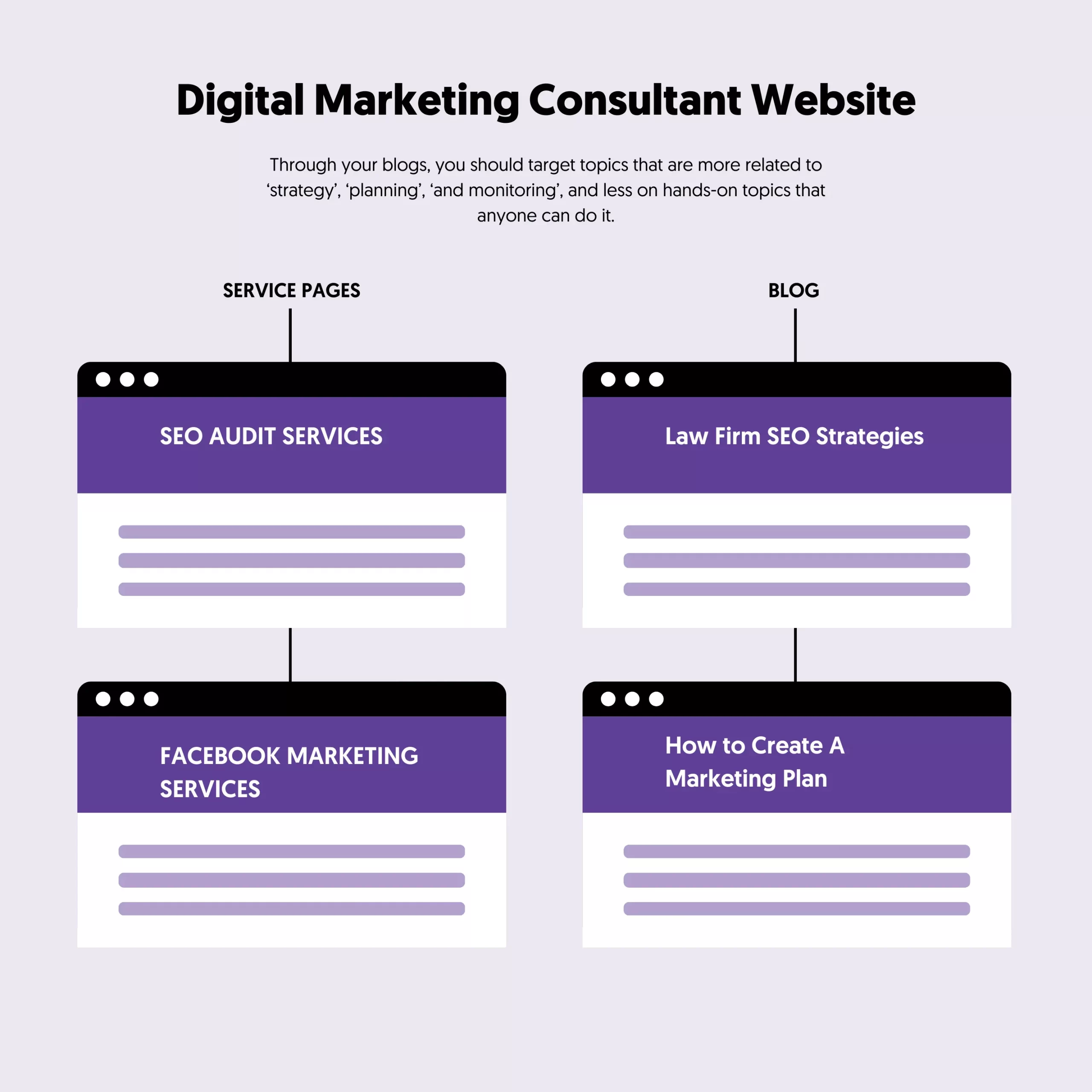Becoming an independent digital marketing consultant is a great career option. It’s a profession that is high in demand and a job you can do remotely and even from the comfort of your home.
Successful online marketing consultants can earn more than $100K per year by offering digital marketing consulting services to other agencies or companies who need help from an experienced and accredited professional.
I’ve been working as a digital marketing consultant for more than 18 years now, and in this guide, I’ll help you understand what it takes to become one.
You will learn what online marketing consultants are expected to do, what skills are needed, how to build them, how to find clients, and how much money you can make.
What Is a Digital Marketing Consultant?
A digital marketing consultant is an experienced digital marketer who is responsible for the promotion or marketing of companies’ products or services using all available online marketing channels. His/her job is to design and monitor the execution of a digital marketing strategy to increase brand awareness, traffic, and sales.
What Does a Digital Marketing Consultant Do?
The main role of a digital marketing consultant is to design a digital marketing strategy and supervise the work of other marketing professionals working on implementing the marketing strategy. Digital marketing consultants usually get paid per hour or per project and don’t have a fixed salary.
A digital marketing consultant is someone that is more experienced in digital marketing compared to other digital marketing professionals. A consultant is self-employed and it’s not an employee of a company.
How to Become a Digital Marketing Consultant
Here are the steps to becoming a successful digital marketing consultant in 2023.
- Build the necessary skills
- Define your niche
- Establish your personal brand
- Build your team
- Decide on your pricing structure
- Choose your tools
- Build your network
- Continue to educate yourself and your team
1. Build the necessary skills

What skills do I need to become an online marketing consultant? To become a marketing consultant, you need to equip yourself with the following skills:
- Search Engine Optimization (SEO)
- Paid Advertising and Marketing
- Social Media Marketing (SMM)
- Content Marketing
- Email Marketing
- Conversion Optimization
- Analytics and Reporting
- Business Management Skills
Search Engine Optimization (SEO)
Having excellent knowledge of SEO is a must if you want to start a successful career in digital marketing. I started my career as an SEO consultant and worked in that position for more than 10 years, and this made it easier to transition to a digital marketing consultant.
Knowing how to use SEO to improve the visibility of a website on various search engines is a critical step for any digital marketing campaign.
As a consultant, your job is to manage your team of SEO specialists and build an SEO campaign that can generate real measurable results. In the marketing world, this is translated into higher rankings and more organic traffic.
So, if you feel that your SEO skills are not optimum, you need to improve them by getting specialized training and practicing.
Training resources to help you become an SEO consultant
Paid Advertising and Marketing
A large portion of the marketing budget for online businesses is allocated to paid advertising. As a marketing consultant, you will be responsible for maximizing the return on investment (ROI) for every dollar spent on ads.
To perform this task successfully, you’ll need to have good knowledge of how the various PPC platforms work, especially Google Ads, Facebook Ads, and Bing Ads.
These are the three major PPC networks but you also need to keep your eyes open and know how to work with Pinterest Ads, Twitter Ads, and others like Tik-Tok.
The only way to become a PPC expert is to work with companies that have big advertising budgets. There are differences between managing a budget of $10K per month and a budget of $100K per month and you need to have the skills needed for this task.
From my experience, it’s difficult to get big companies to trust you a large budget if you don’t have case studies or success stories in your portfolio, and the best way to get the necessary experience is to work as part of a team of a big agency or company.
This will help you build your portfolio and confidence so that you can handle campaigns with larger budgets, which means more revenue for your business.
Social Media Marketing (SMM)
A good digital marketing consultant should know how to use social networks as a sales channel.
In the past, social networks (especially Facebook) were considered less important for conversions, but over the years, they have proven otherwise.
You need to know how to design campaigns to drive targeted traffic from social networks and how to utilize their community-building features to raise brand awareness and increase customer engagement.
Content Marketing
Besides budget management, a large portion of your time will be spent on managing content.
This can be website content (such as blog posts, case studies, etc), ad copies, social media postings, or content published on other websites as guest posts or sponsored content.
To successfully handle all content needs, you should have the experience to design a well-planned content strategy. A content strategy is the master plan behind any content marketing campaign.
Resources to help you build your content marketing skills
Email Marketing
Building a profitable email list is something that many companies fail to do, and if you can provide them with this service, it will be beneficial for both.
To use email marketing as a sales channel, you need to have a good understanding of email sales funnels and how to use email automation to get the work done.
So, if this skill set is missing, start by studying the basic and advanced email marketing concepts.
Resources to help you with email marketing
Conversion Optimization
Conversion optimization is the only factor that can generate more revenue for a company without increasing traffic.
By becoming a conversion optimization expert, you can bring immediate benefits to a business and this automatically translates to higher fees for your services and more projects.
Consider a company selling a product at $5000 with a conversion rate of 1.5%. If you can increase the conversion rate to 2%, this will automatically generate more revenue for them and this will be the passport for you to get more work from them.
Besides the above essential digital marketing skills, you also need to have basic knowledge of:
- Basic development skills (HTML, CSS)
- Website marketing
- eCommerce Marketing
- Business management skills
- Analytics and reporting skills
2. Define your niche
The next step in becoming a digital marketing consultant is to define your niche.
This means two things. To define your main area of expertise and define your target market.
Define your main area of expertise.
As a digital marketing consultant, you need to have good knowledge of all digital marketing channels, but you need to choose an area in which you can really excel. This is usually related to your past working experience and success stories.
For example, if you have a good SEO case study to share, then use that to get more clients primarily interested in SEO. It’s easier to ‘convince’ new clients to work with you if you have success stories to share with them. Once you start working with a client, you can gradually introduce the full stack of digital marketing services.
Define your target market.
Instead of trying to get any client from any industry, it is better to specialize in one area. Through specialization, you’ll be able to standardize your process, build more success stories, and eventually be known as the digital marketing expert for that niche.
The way to establish yourself as an expert for a particular niche is through blogging and publishing research studies for that niche.
For example, if you want to become a marketing consultant for law firms, you need to start blogging on topics related to ‘law firm marketing’, start connecting with lawyers on social media, attend local events, and try to become the ‘go-to resource’ for anything that lawyers should know about marketing.
3. Establish your personal brand
The next step is closely related to what I’ve just explained above. To work as a consultant and charge a higher fee for your services, you need to establish your personal brand.
Even if you’re managing an agency or team, the face of the company and what will bring new clients in is your personal brand.
Having a strong personal brand is more powerful than having a business brand because people looking for consultancy services want to know the background and experience of the person who will handle their marketing strategy.
They don’t want to engage with a company that may assign their project to any team member, but they need to know who will handle the work.
Let me give you an example to understand the importance of having a personal brand.
The majority of them didn’t care about my agency or what other work we did. They wanted to hire me to help them with their digital marketing.
There are two ways to promote yourself and build a brand around your name:
#1 - Blogging
I cannot think of a valid case for someone who wants to make a career in digital marketing without having a good digital marketing blog. Your blog is your most valuable asset and vehicle to get more clients.
So, if you want to become a successful digital marketing consultant, this is the first thing you should do.
Start a website and begin blogging about digital marketing. If you have already defined your target market and niche (as explained above), these are the topics you should blog about.
#2 - Publishing your work on leading industry websites
Besides building a portfolio of content assets on your blog, you must demonstrate your authority and expertise by getting published on high-authority digital marketing websites.
Depending on what websites you can get your articles published on, it’s a great opportunity to get:
- More traffic to your website
- More clients
- Industry Recognition
- Precious backlinks to your website
It’s not easy to get accepted as a guest author on premium websites, but it’s not impossible either. I got my articles published on websites like Social Media Examiner, Content Marketing Institute, Business.com, and many others by following this path:
Work on your blog first - When you apply to contribute content to other websites, the first thing they ask is to see samples of your work, and having an active blog with lots of high-quality articles is a must.
Get published on other websites before pitching the high authority websites - Get a couple of articles published on good websites before pitching high authority websites. Most editors want to see your written work on websites other than yours, so get yourself prepared.
Study the website and then pitch - Make sure that before you pitch an idea for a blog, study their guest post guidelines carefully and do your research to suggest a topic that is closely related to their audience, but they don’t already cover.
This can be a bit time-consuming because large websites have a lot of content, but it will dramatically increase your chances of getting accepted as a contributor.
4. Build your team
As a digital marketing consultant, you’ll have to deal with two scenarios regarding client work.
The first scenario is that you’ll be hired to provide consulting services only and the implementation will be done by an in-house team.
The second scenario is that you’ll be hired to do the work from start to finish. In this scenario, it’s impossible to do all the tasks yourself without having a team to help you.

In your team you will need to have:
SEO Expert - someone who will handle the SEO work.
Developer - 99% of the projects will require changes to a website or the development of new landing pages, so having a developer in your team is a requirement.
PPC Expert - a digital marketer with good knowledge of how to optimize PPC campaigns. As a consultant, you’ll devise the strategy to follow, but a team member can do the implementation.
One or more writers - It is certain that you’ll need a lot of content for your campaigns, and having a few good writers on your team can prove very helpful.
Social media specialist - a person to help you with social media campaigns and tasks that are repetitive and not worth spending your valuable time on.
Should you hire full-time or part-time employees?
This is a very common question among new entrepreneurs, and the answer is it depends. If you can secure projects that require ongoing work for several months (or years), then hiring full-time employees is better.
If you prefer to have more flexibility and lower costs, then hiring digital marketing freelancers is a more suitable choice. Of course, you can always go with a hybrid solution i.e. to have both full-time and part-time employees in your team.
Whichever the case, establishing long-term relationships with the people you work with is very important. It will help you save time training new employees and it will increase the quality of your work since everybody will know exactly what to do.
5. Decide on your pricing structure
One of the first questions potential clients will make when enquiring about your consulting services will be “How much do you charge?”. It’s an expected question since the cost is an important factor for any business deal.
From your point of view, you should be prepared to answer this question in a clear and concise manner.
There are three ways to charge for your consulting services:
- Per hour
- By month
- Per project
The first two methods are easy to define. For the ‘per hour,’ you can decide a range for your hourly rate, and depending on the client, you can set your price (see below the average rate of digital marketing consultants).
For the ‘by month’, you need to prepare digital marketing packages that will include a set of pre-defined services and place a price for that. You can also agree with the client on the maximum number of hours to allocate to their project per month and based on the rate calculate the monthly cost.
For the ‘per project’, you’ll need to carefully examine the requirements, calculate your costs, add your profit margin, and come up with a price to get the job done.
How much you can charge depends on where the client is located, what is their budget, their type of business, how much they are willing to pay, and many other factors. During negotiations, you can agree with the client on a rate that makes both parties happy.
Don’t forget that, the rate is strongly related to the expected return. For example, if you can increase the client revenue by $100K per year then you safely go for a higher rate. No one will complain because the return is justified.
So, before setting a rate, try to think about what would be the actual monetary benefit for the client as a result of your work.
6. Choose your tools

The next step in the process is to choose your digital marketing tools. These are the tools you’ll need to handle your work and recommend to your clients.
When it comes to tools, there are many available choices. My recommendation is to use as few tools as possible. Becoming an expert in a couple of tools is more effective (time-wise and cost-wise) than using some features of many tools.
The tools you’ll need (and the ones I’m using are):
Google G-Suite: For emailing, documentation collaboration, meetings, presentations, and reporting.
Google Data Studio: It’s a free reporting tool from Google that integrates seamlessly with Google Analytics and Google Search Console.
MailChimp: It’s one of the best and easiest-to-use options when it comes to email marketing-related tasks.
Optinmonster: A great SAAS platform for managing popups, increasing email subscribers, and improving conversion rates for landing pages.
SEMRush: All-in-one digital marketing platform. In my opinion, is the best tool in the market that has all the features digital marketing consultants need to do their work successfully.
Don’t forget to use your affiliate link and take advantage of the sale commission (in many cases, it’s recurring).
Other tools you’ll need to perform your work are:
- Google Search Console
- Google Analytics
- Google Merchant Center
7. Build your network
There are two ways to build your network to improve your reputation and, at the same time, create a new source of leads for your consulting business.
Connect with other consultants in your niche
While social media networks are not the first place to look for new clients, they are great for establishing your brand. Your task is to find and connect with other consultants in your niche and gradually grow your following. The best tools for this task are LinkedIn, Twitter, and Facebook (in that order).
Having a decent number of followers and being followed by influencers in your field, it’s good for your reputation and branding.
Connect with your clients and their friends
I’ve mentioned above that ‘word-of-mouth’ is a great way to get new leads and one way to make this happen is by connecting with the ‘friends’ of your clients.
The tool to use for this task is LinkedIn. When you get a new client add in your onboard checklist to connect with them on LinkedIn. Then visit their profile page and connect with their friends, employees, and business partners.
This increases the chances of getting their friends to notice you and have you in mind when they need digital marketing services. It’s more likely to trust someone that has already worked with a friend or business partner than someone they never heard of.
8. Continue to educate yourself and your team
Digital marketing learning never stops. You can never say that you know everything there is to know and marketing techniques change all the time.
There are a plethora of digital marketing training courses you can use to help your team enhance their skills and become more efficient in their work. You can even encourage them to get certified and use that as an additional selling point when discussing with your clients.
The Digital Marketing Full Course by Reliabelsoft Academy is a great course for this purpose.
Digital Marketing Training Resources
How Do You Find Clients Looking For Digital Marketing Consulting Services?
The most challenging part of being an online marketing consultant is finding the right type of clients. As mentioned above, you don’t want any clients but those with big marketing budgets and need consultancy (not just implementation).
Advertising your services on Google or Facebook is not the way to find new clients. The advertising costs are huge and the chances of convincing a company that never heard of you to hire you to work on their marketing, are minimum.
This is what worked for me in the last 15 years, and if you ask other consultants, they will tell you that this is the secret to running a successful digital marketing consulting business.
So, how do you get clients to come to you?
By blogging on topics that your potential clients search for. I’ve explained above the importance of having a blog, but it’s equally important to blog about topics that can get you leads.
Let me give you an example to understand the difference.
People searching for “How to Optimize Page Titles” are unlikely to ask the help of a consultant to get the work done. Most probably they are looking for an article to help them go through the process themselves.
On the other hand, people searching for "Digital marketing strategies for law firms" are more likely to consider getting the help of a consultant if they are convinced that it’s the right person for the job.
Try to get into the shoes of online business owners and address their needs by providing answers to their high-level strategy questions through your blog posts.
Make your posts thorough and explain why they need to follow the particular strategy and what would be the business benefits if they do so. Try to make the posts informative with your own case studies and research data.
How Much Money Do Marketing Consultants Make?
The average hourly rate of a digital marketing consultant is between $100 - $200 per hour.

As you can see in the graph above, more than 40% of marketing consultants charge less than $100 per hour.
How much money you can actually make depends on the number of billable hours per month minus any expenses (freelancer fees, hosting, tool subscriptions, etc).
A word of caution for beginners. The average rate might be $140-$160 per hour but that does not mean that you can charge this rate from day one. You need to prove to your potential clients that you deserve this rate and this is usually through the delivery of measurable results.
For comparison purposes, the digital marketing salary of an experienced digital marketing specialist (10+ years) is around $65K per year and an experienced digital marketing manager (10+ years) is around $90K per year.

Key Learnings
Working as a digital marketing consultant is a great job. You can be your own boss, work remotely or even from home, and at the same time earn a good salary.
To become a marketing consultant, you need more than basic digital marketing skills. You need to be an expert in all areas of digital marketing and you need to have years of experience in the industry.
Being a consultant is different from being a digital marketing specialist or digital marketing manager. A consultant is self-employed or owns a digital marketing agency and offers consulting services to other agencies, teams, or companies.
To make more money as a consultant instead of working as a specialist or part of a team, you need to prove your expertise by having several successful case studies in your portfolio. That’s the only way to get new clients with big budgets to hire you and your team for your services.
The best way to find new clients that might need the help of a consultant is to maintain an active blog and write about topics related to strategy planning targeted to company decision-makers.




